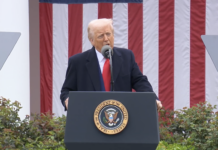
(GA Recorder) — Gov. Brian Kemp has signed into law a measure creating a limited process for reviewing tax credits while also adding more special-interest tax breaks.
A pair of legislative leaders can now ask auditors to take a critical look at whether the state is benefiting from the tax perks usually passed in the name of job creation, but that costs the state treasury billions of dollars every year.
The chairs of the Senate Finance and House Ways and Means committees will both get a crack at requesting up to five economic analyses each year. Nearly $200,000 was put in this year’s budget to pay for the program.
Kemp vetoed a similar measure in 2019 over concerns about the way the reviews would be done. Lawmakers recast their plans this year, setting up the state Department of Audits to hire an independent auditor to do the analysis.
Kemp signed the bill Tuesday at the Cobb Chamber of Commerce. The governor called it “the logical next step in our efforts to support businesses producing life-saving medical devices and supplies here in the Peach State,” referring to one of several tax breaks added or extended through the bill.
Lawmakers have created dozens of tax breaks over the years, including a popular one often credited with attracting the film industry to Georgia and another that sets aside $60 million every year to reward donors who give to struggling rural hospitals.
Before now, there was no established plan to scrutinize whether the many special interest tax breaks on the books live up to the benefits touted when they were created. Occasionally, the state’s auditor or legislative panels have examined some tax breaks, like the film and rural hospital tax credits, but there was no routine review.
“This is a great step forward to keep Georgia the #1 place to do business while measuring the return on investment of our tax credits,” Sen. John Albers, a Roswell Republican who sponsored the bill, said in a statement Tuesday. “This responsible and reasonable approach will ensure continued success and accountability.”
It is unclear when the reviews will begin since the May 1 deadline for requests this year has already come and gone. When asked Tuesday, Albers only said that “requests for analysis will be done shortly.”
The measure also became what is often referred to in legislative parlance as a “Christmas tree” bill after lawmakers used it to add or extend tax credits and tried to renew a costly rural jobs program that the GOP chair of the Senate Finance Committee, Sen. Chuck Hufstetler, has called a scam.
The rural jobs component was discarded, but the new tax credits – such as one meant to help Lockheed Martin compete for military contracts – remained in the bill. Because of the new tax credits, the bill is a “mixed bag of changes,” said Danny Kanso, policy analyst with the Georgia Budget and Policy Institute.
The new tax perks could also jeopardize more than $50 million in federal funding since the coronavirus relief aid is not supposed to “directly or indirectly” offset a reduction in revenues, Kanso said.
“The bill creates a new process for the General Assembly to review existing and proposed special-interest tax breaks, a positive step forward that will give lawmakers new tools to evaluate and trim back the many subsidies that do not deliver on their promise,” Kanso said.
“However, the inclusion of several new corporate tax breaks, including a hefty incentive aimed at Lockheed Martin, could not only further carve into state revenues but may also jeopardize over $50 million in federal funding — which means less money for the state to fund critical priorities like broadband, our public schools or health services.”
A bipartisan proposal to create a special panel on “tax reform and fairness,” which would have undertaken a sweeping review of the state’s tax structure, easily cleared the state Senate this year. But the measure was overwhelmingly defeated in the House, where opponents said they were wary the proposal was a cover to raise taxes.







